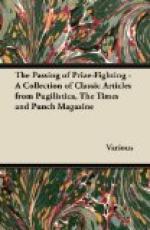On going forth last night, a friend to
see,
I met a man by trade a s-n-o-b;
Reeling along the path he held his way.
“Ho! ho!” quoth I, “he’s
d-r-u-n-k.”
Then thus to him—“Were
it not better, far,
You were a little s-o-b-e-r?
’Twere happier for your family,
I guess,
Than playing off such rum r-i-g-s.
Besides, all drunkards, when policemen
see ’em,
Are taken up at once by t-h-e-m.”
“Me drunk!” the cobbler cried,
“the devil trouble you!
You want to kick up a blest r-o-w.
Now, may I never wish to work for Hoby,
If drain I’ve had!” (the lying
s-n-o-b!)
“I’ve just return’d
from a tee-total party,
Twelve on us jamm’d in a spring
c-a-r-t.
The man as lectured, now, was drunk;
why, bless ye,
He’s sent home in a c-h-a-i-s-e.
He’d taken so much lush into his
belly,
I’m blest if he could t-o-dd-l-e.
A pair on ’em—hisself
and his good lady;—
The gin had got into her h-e-a-d.
(My eye and Betty! what weak mortals we
are;
They said they took but ginger b-e-e-r!)
But as for me, I’ve stuck (’twas
rather ropy)
All day to weak imperial p-o-p.
And now we’ve had this little bit
o’sparrin’,
Just stand a q-u-a-r-t-e-r-n!”
* * * * *
A man in New-York enjoys such very excellent spirits that he has only to drink water to intoxicate himself.
* * * * *
TO JOBBING PATRIOTS.
MR.
GEORGE ROBINS.
with unparalleled gratification,
begs to state that he has it in
Command
to announce, that in consequence of
LORD
JOHN RUSSELL’S LETTER
to the citizens of London having satisfactorily
convinced her
MOST
GRACIOUS MAJESTY
that
a change of ministry
CANNOT
be productive of a corresponding transformation
of measures, and that
the late
POLITICO-GLADIATORIAL
STRUGGLE
for the guerdon of office could only have
emanated from a highly
commendatory desire on the part of the
disinterested and patriotic
belligerents
TO
SERVE THEMSELVES
or
their country,
HIS
ROYAL MISTRESS,
ever solicitous to enchain the hearts
of her devoted subjects, by an
impartial exercise of her prerogative,
has determined to submit to the
ARBITRATION OF HIS HUMBLE
HAMMER,
some of those desirable places,
so long known as the stimuli to the
LACTANT
LYCURGI
of the nineteenth century.




